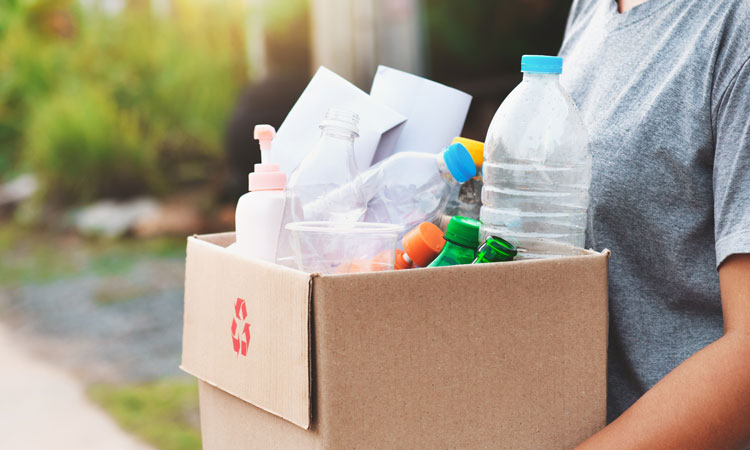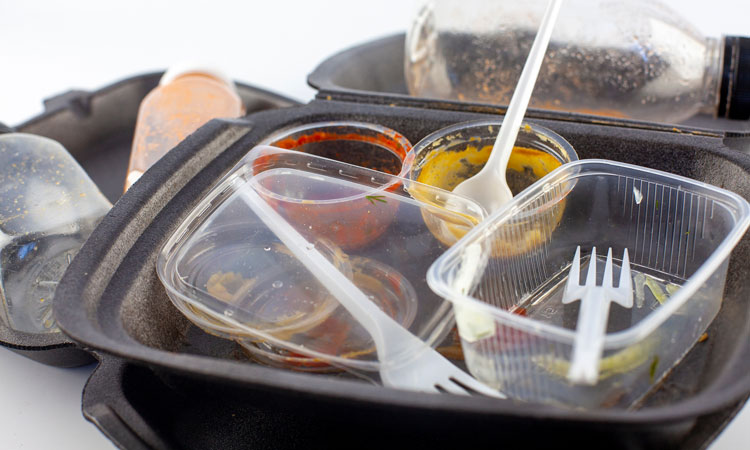Recycling should be last resort for managing packaging waste
- Like
- Digg
- Del
- Tumblr
- VKontakte
- Buffer
- Love This
- Odnoklassniki
- Meneame
- Blogger
- Amazon
- Yahoo Mail
- Gmail
- AOL
- Newsvine
- HackerNews
- Evernote
- MySpace
- Mail.ru
- Viadeo
- Line
- Comments
- Yummly
- SMS
- Viber
- Telegram
- Subscribe
- Skype
- Facebook Messenger
- Kakao
- LiveJournal
- Yammer
- Edgar
- Fintel
- Mix
- Instapaper
- Copy Link
Posted: 18 August 2022 | Josephine Liang | No comments yet
Josephine Liang, CEO of the reusable lunchbox scheme CauliBox, asserts that recycling won’t solve our sustainability problems.


Recycling is often promoted as the easiest way to achieve a more sustainable lifestyle and reduce our carbon footprints. In 2021, 88 percent of people in Britain claimed to recycle regularly, which sounds great on paper, but it isn’t enough when only about 14 percent of all plastic packaging is recycled. Placing recycling at the centre of our sustainable infrastructure will not help in tackling climate change.
The various myths surrounding proper recycling as well as flaws within the recycling industry mean that recycling cannot be our first line of defence against the climate crisis.
Can the UK recycle effectively?
According to the recycling tracker report in 2021, 55 percent of British households put at least one item in the general waste that could have been recycled. This can be attributed to consumer carelessness, or confusion at the complexities of the recycling process, which can be hard to navigate. Different councils enforce different rules, and packaging can be unclear and vague in its instructions for disposal.
Contamination is another major issue limiting the efficacy of recycling in helping to support a greener planet. Most UK households (85 percent) put at least one item in the recycling that is not accepted by their local council. This risks spoiling batches of recycling waste where food or low-grade plastic is present in recycled materials, leaving it unsuitable for reuse. Recycling might make us feel like we are doing our part, but putting unwashed food jars, oil-laden catering trays and unfinished food remnants into the recycling, means any potential benefits are being undone.
Issues within the recycling industry
Many plastic materials that we are told to recycle include toxic preservatives and absorb harmful chemicals, meaning often they cannot be recycled into food-grade packaging. The process itself is also not an economical one, with costs associated with recycling plastic growing in recent years, due to expenses of collection, transportation and reprocessing.


Contamination is another major issue limiting the efficacy of recycling in helping to support a greener planet
Other attempts to reuse plastics include the chemical recycling process, which aims to convert plastics into fuels and chemical components. Unfortunately, this is also burdened with problems. This process, which attempts to divert plastic away from landfill through breaking it back down to its chemical components, creates hazardous pollutants that release into the environment. When considering all the limitations in the recycling process, it is clear we need to change our sustainability frameworks.
Similarly, compostable packaging also has limitations in its sustainable ambitions, largely due to issues within the current infrastructure that do not allow scaling of commercial composting. Most compostable packaging isn’t accepted into the food waste stream, and so ends up in landfill. Both caterers and offices need to design a specific waste stream to dispose of compostable packaging effectively; however this can be expensive. The cost and labour associated with the transportation of compostable waste is the reason why reusables are supported by companies like Veolia.
How can caterers be more sustainable?
Trying to limit your waste is a great foundation for sustainable living. Reducing the amount of single-use plastics used, swapping plastic straws for metal reusables and buying in bulk to limit the number of plastic containers are all ways to optimise sustainability.
The wide use of single-use plastics in on-site catering has a particularly big impact on the environment. Disposable packaging generates 11 billion pieces of waste annually, yet the catering industry continues to use it since there are limited alternatives. With all the failures of plastic packaging recycling and compostable packaging waste management, durable reusable packaging is the future of sustainability. Adopting reusables as standard practice will help limit disposable waste, and reuse solutions like CauliBox, which rewards sustainable behaviours, will also assist employees in reaching their green goals.
Adopting reusables as standard practice will help limit disposable waste
Establishing a sustainable infrastructure that optimises simplicity for employees is key. Wasteful habits are easy to form, and so making sustainable habits simple and accessible is one of the most effective ways to encourage positive behaviour and drive change. Normalising these practices may also encourage employees to lead greener personal lives.
Although much of the confusion around recycling is out of our control, educating the workforce about common recycling myths, ensuring waste disposals are labelled clearly to make it as straightforward as possible, and adopting reusable packaging and reuse solutions over disposable packaging will reduce recycling mistakes and help to make your organisation more eco-friendly.
About the author
Josephine Liang is a sustainability expert and CEO of CauliBox, the award-winning, tech-enabled reusable food packaging solution for workplace dining. She has worked with corporations (including Unilever & Sainsbury’s), local authorities (Westminster City Council) and higher educational institutes (London School of Economics) as well as numerous food enterprises such as Costa and Gail’s Bakery in cutting food waste and advising on sustainable development. Josephine was awarded a special “Women in Food” award by the Mayor of London in 2019 and was named on Forbes 30 under 30 in 2021.
Related topics
Environment, Packaging & Labelling, Sustainability, Technology & Innovation









